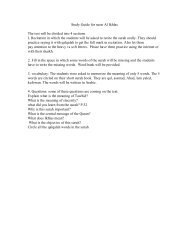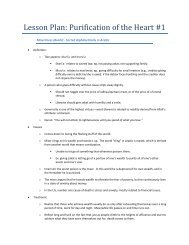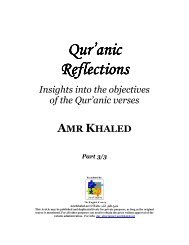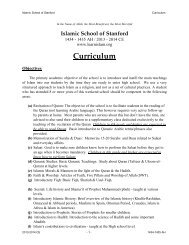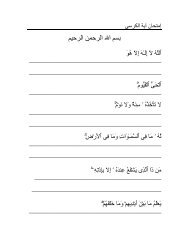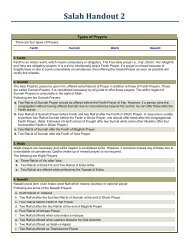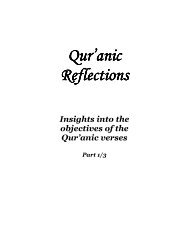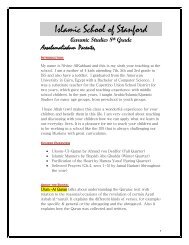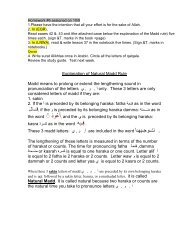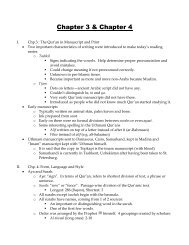Quranic Reflections - Islamic School of Stanford
Quranic Reflections - Islamic School of Stanford
Quranic Reflections - Islamic School of Stanford
You also want an ePaper? Increase the reach of your titles
YUMPU automatically turns print PDFs into web optimized ePapers that Google loves.
Torment and destruction are never inflicted upon people unless they become unjust.<br />
Allah (SWT) says what can be translated as, “Surely Allah does not do injustice to<br />
mankind in anything, but mankind do injustice to themselves.” (TMQ 44:10).<br />
People are directly responsible for what happens to them. They should not accuse<br />
Allah (SWT) <strong>of</strong> being unjust to them when they encounter anguish. On the contrary,<br />
they should reconsider their own deeds, as Allah (SWT) says what can be translated<br />
as, “And We have already caused the generations even before you to perish as<br />
soon as they did injustice and their Messengers came to them with the Supreme<br />
evidences; and in no way were they to believethus We recompense the criminal<br />
people" (TMQ 13:10). They were doomed only when their corruption and injustice<br />
became evident.<br />
Many more ayahs stress the same notion, as Allah (SWT) says what can be translated<br />
as,<br />
“And for the ones who have earned odious deeds, the recompense <strong>of</strong> a bad deed<br />
will be the like <strong>of</strong> it, and humiliation shall oppress them…” (TMQ, 10:27),<br />
“There! Every person will know (exactly) what he had earned before…” (TMQ<br />
10:30), and<br />
“Thus the Word <strong>of</strong> your Lord has come true against the ones who were immoral<br />
that they do not believe” (TMQ 10:33).<br />
On the other hand, the ayahs indicate that Allah’s reward is not haphazardly granted.<br />
Rather, it is granted to those who well deserve it. Allah (SWT) says what can be<br />
translated as, “To the ones who are fair-doers is the fairest reward and an<br />
increase…” (TMQ 10:26).<br />
Allah (SWT) knows his worshippers best<br />
The surah then moves on to a new concept and introduces an abrupt question; how do<br />
you wonder at the destiny <strong>of</strong> Allah (SWT) when your attitude and deeds towards it are<br />
even stranger Read the following ayah, where Allah (SWT) says what can be<br />
translated as, “And when adversity touches man, he invokes Us to his side, or<br />
sitting, or upright, then as soon as We have lifted <strong>of</strong>f him his adversity, he passes<br />
on, as if he had not invoked Us to an adversity that touched him…” (TMQ<br />
10:12).<br />
This ayah depicts two different scenes in a very wonderful way; the image <strong>of</strong> a<br />
downhearted man who invokes Allah (SWT) at all times while lying on his side,<br />
sitting, or standing. This image implies slow motion on the part <strong>of</strong> the man invoking<br />
Allah (SWT). However, once the crisis is over, he rashly changes his behavior, “he<br />
passes on”, to indulge in life forgetting his Creator. He moves on without thanking<br />
Allah (SWT) for His blessing or even contemplating on the crisis he has been through.<br />
In the following ayah, Allah (SWT) says what can be translated as, “And when We<br />
cause mankind to taste mercy even after tribulation has touched them, only then<br />
do they have a scheming against Our signs; Say, “Allah is swifter at scheming…”<br />
(TMQ, 10:21).<br />
This ayah explains how fate and destiny take place. If some wonder at Allah's fate,<br />
Allah (SWT) does know who would thank Him and who would not. The next ayah<br />
follows to elaborate more, where Allah (SWT) says what can be translated as, “He is



